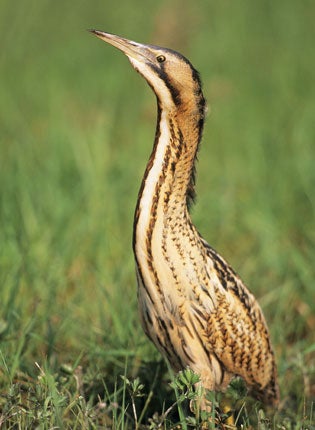Bitterns boom in conservation success
Bird declared extinct in 1880 makes remarkable comeback

The bittern, one of Britain's rarest birds, is booming again after research revealed record numbers across the country.
Studies revealed 82 male bitterns calling or "booming" this spring from deep within their wetland strongholds.
An icon of British ornithology, the bittern, which is closely related to the heron, was declared extinct in the UK in the 1880s. But with the help of dedicated conservation programmes the bird has fought back to record their best figures for 120 years.
And despite their extremely shy ways there are recent records of wintering birds turning up on a housing estate and in London.
The distinctly odd, tawny-coloured bittern is the bane of birdwatchers UK-wide as the birds live in the heart of dense reedbeds and specialise in being as secretive as possible. The males' highly evocative booming call is used to attract a mate and establish territories. The boom has been likened to the sound of a cow blowing over the top of a wine bottle and can be heard three miles away. The bird suffered a dip in population numbers during the 1990s but managed to fight back from the brink, confined to dense reedbeds in East Anglia, Lancashire and Somerset.
Dr Mark Avery, the RSPB's conservation director, said: "When we feared the bittern would hit the buffers again the conservation community rallied to its cause by managing or recreating extensive tracts of habitat.
"We didn't believe at the time that we'd see the bittern population bounce back to record levels in just 12 years."
Researchers recorded 82 male booming bitterns, with the Suffolk coast holding the highest number of birds, followed by the Norfolk Broads and The Fens.
Unscrupulous male bitterns mate with more than one female so researchers also count the number of bittern nests to get a more accurate picture of the number of the birds in the country.
Dr Tom Tew, chief scientist for Natural England, the Government's countryside watchdog, said: "Extinct by 1886, the bittern returned in the early 20th century, coming near to extinction again in the mid 1990s. Since then, concerted efforts by the conservation community to restore dry reedbeds and create new areas of wet reedbed have paid dividends, with the population now as large as it has ever been during the 20th century."
The birds' numbers swell during the winter as foreign bitterns fly in to avoid continental cold.
In recent years this led to a bittern turning up on a Milton Keynes housing estate and last year at least two birds spent the winter at the Wildfowl and Wetlands Trust (WWT) centre at Barnes, just miles from the centre of London.
RSPB spokesman Graham Madge said the sound of the bittern was evocative of the wild. He added: "It's an icon and a flagship species in terms of conserving our wetland habitats and species."
Join our commenting forum
Join thought-provoking conversations, follow other Independent readers and see their replies
Comments
Bookmark popover
Removed from bookmarks